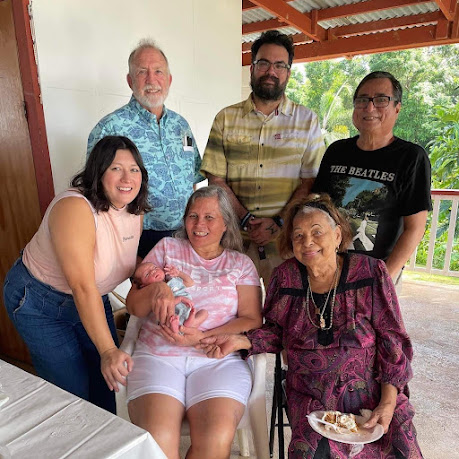Adios Tan Agnes
The grandmother of my partner Desiree, Tan Agnes Duenas Perez (familian Pepero) passed away last month at the age of 92. Her youngest great-grandchild is our daughter Lulai, born just last year. I am so thankful that they got to meet before her passing. I am also glad that I have was able to spend some time with her and listen to her stories.
She was just 11 years old when the Japanese invaded Guam. She was the eldest of her siblings and helped care for them during this traumatic time. From her auntie Tan Amanda Guzman Shelton, a pioneering Chamoru nurse she learned some basic skills for helping the sick and the elderly. Soon after the war she married musician Josephat Mauro Perez and began to raise a large family. She spent time in those immediate postwar years helping to start the network of community centers and programs for manåmko’. Her family would become prominent in the village of To’to’ and well known for their musical talents.
Tan Agnes had 12 children, 9 of whom are still living. Some living here on island but most living in the states. Thankfully all were able to gather on island to say goodbye to her before she passed. Some of her grandchildren and great-grandchildren were also able to fly back. Over the past few weeks seeing Desiree’s family gather and share stories, at masses, at dinners and the funeral, I have regularly been reminded about some Spanish descriptions of ancient Chamoru funerals and the spirituality of our ancestors.
As far as we know ancient Chamorus didn't believe in pantheons of Gods, their religion was instead focused on the veneration of the spirits of their ancestors, and not just those of long ago, but those who had died more recently as well. For example, when someone passed away the family would gather to anoint the body with coconut oil, use flowers to make it smell fragrant.
They would talk to the deceased and insist that they could not leave, that they needed to stay with the family. If they were excellent at fishing, the family would surely starve without them. If they were good at fighting, the family would never win another battle without them. If they were the rope that held the family together, in love and peace, then they surely could not go on without them.
All of this was designed to encourage the spirit of the deceased loved one to stay with its living family members. To stay close to their children, their grandchildren, their lands, their home, to keep their descendants safe and strong. Just as they had watched over them in life, please continue to keep the family strong as an ancestral spirit.
I thought the most of this, when in the To'to' church for the funeral and also at the Pigo Cemetery, the children of Tan Agnes gathered to sing to her. The song was “Wherever You Go” by Gregory Norbet. It was a song they had also sung for the funerals of their siblings who had already passed away.
It was a beautifully touching moment, and I couldn’t help but think of the cultural contrast across the centuries. Today, we might sing to our deceased loved ones saying that we will see them in time and to wait for us in the afterlife. In ancient times, you would sing to them to ask them to stay with the family. In both eras, we see families honoring their loved ones and giving voice to the powerful connection that persists even beyond death.
U såga gi minahgong.





Comments